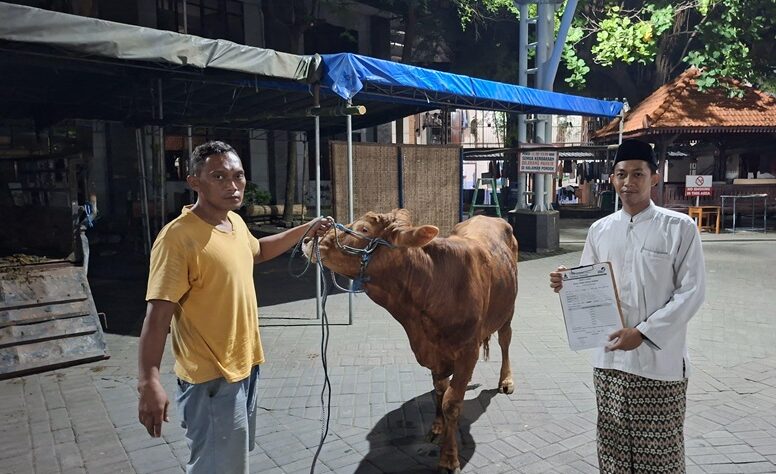Iduladha is a holy moment that is not only celebrated as a form of worship to God, but also as a real reflection of a sense of humanity and social solidarity. One of the main forms of worship on this big day is the slaughter of sacrificial animals. More than just a religious ritual, the true sacrifice is a means to share with those who cannot afford, so that all levels of society, especially the poor, can also feel the pleasure of meat that they may rarely enjoy in everyday life. However, in reality, the implementation of sacrificial distribution in Indonesia, both in urban and rural areas, still faces serious challenges related to justice and equity.
One of the phenomena that often occurs in Indonesia is the imbalance in the distribution of sacrificial meat between the city and village community, even between residents in the same region. In urban areas, especially in densely populated areas such as Jakarta, Surabaya, and Bandung, there are often piles of sacrificial meat in the hands of relatively capable residents. Not infrequently a person can receive more than one pack of sacrificial meat, while in other areas that are remote or unknown, many do not even get at all.
Also read: White Crasek on Sacrifice Day
This is where the value of humanity should be the main foundation in the implementation of sacrificial worship. Humanity teaches us to be sensitive to the suffering of others, to realize that in the happiness we feel, there are other people’s rights that must be fulfilled. God ordered sacrifice not only as a form of individual obedience, but also as a social mechanism to elevate the dignity of the poor.
A sincere sense of humanity will encourage the sacrificial committee and the sacrificial shohibul (sacrificial people) to not just surrender meat to anyone who comes, but rather distributes it carefully, recorded, and based on needs. Those who need the most, such as the poor, the elderly alone, orphans, daily laborers, and people in remote areas must be a top priority in receiving sacrificial meat.

In villages, especially remote ones, the main challenge is the number of sacrificial animals that are very limited. Many villages are only able to cut one or two cows, which must then be divided into hundreds of family heads. On the other hand, the spirit of mutual cooperation and a high sense of kinship often makes the distribution more equitable and fair. The sacrificial committees in the village generally know the economic conditions of their citizens, so they can easily determine who is really worthy of accepting.
While in big cities, although the number of sacrificial animals is abundant, the main challenge lies in data and distribution systems. Many sacrificial committees do not have accurate data about who is worthy of receiving, so the division is done in general – who can quickly. Not infrequently the middle to upper class people join in queuing sacrificial meat, not because they need, but because they feel they are entitled. This reflects that the sense of empathy and social responsibility has not grown evenly in all circles.
Collaboration and Utilization of Technology
To create a just and equitable distribution of sacrifice, concrete steps are needed from various parties. First, The sacrificial committee in every mosque or institution should cooperate with RT, RW, or local social institutions that already have data on poor citizens. Accurate data collection is the key to avoiding overlapping or distribution that is not on target.
Also read: Have we really sacrificed?
Second, it is necessary to develop a technology -based distribution system. In the digital age, the application or geographical information system can help map areas that lack sacrifices and direct the advantages of one region to another. Philanthropic institutions such as Dompet Dhuafa and ACT have begun this initiative, by sending sacrifices to remote areas and affected by disasters.
Third, Education to the community is very important. The community needs to be given an understanding that sacrifice is not only about slaughtering animals, but about social justice. Those who are able to be willing not to accept meat, so that they can be allocated for those who need more.
Sacrifice policy for all
Sacrifice is a lesson about sincerity, sacrifice, and empathy. When the distribution is carried out evenly and fairly, the wisdom of sacrifice can be felt by all levels of society. Those who live in limitations will feel that they are not alone, that there are still brothers and sisters who care.
Also read: Improve the quality of faith from the sincerity of sacrifice
More than that, the sacrifice is able to rearrange the sense of brotherhood in the midst of an increasingly individualistic society. He reminded us that in our property, there are other people’s rights that we must issue. With sacrifice, social gaps can be narrowed, and economic inequality can gradually be overcome, if the spirit of humanity becomes the spirit of every action.
Writer: trough
Editor: Rara Zaryry
Game Center
Game News
Review Film
Rumus Matematika
Anime Batch
Berita Terkini
Berita Terkini
Berita Terkini
Berita Terkini
review anime
